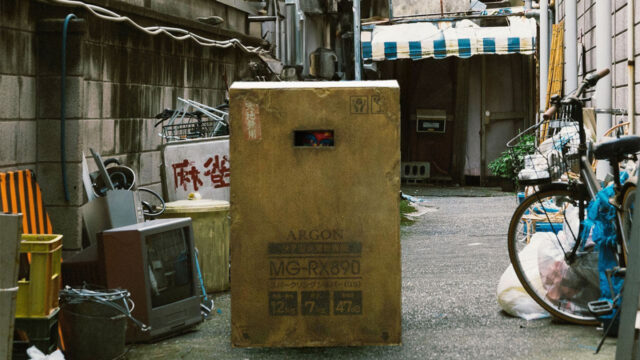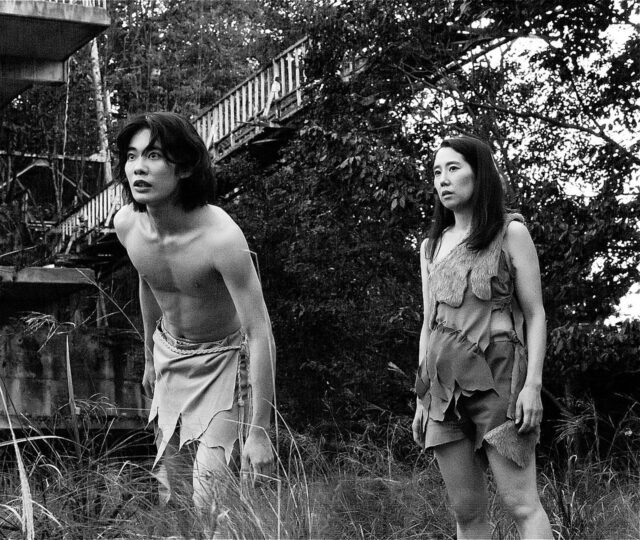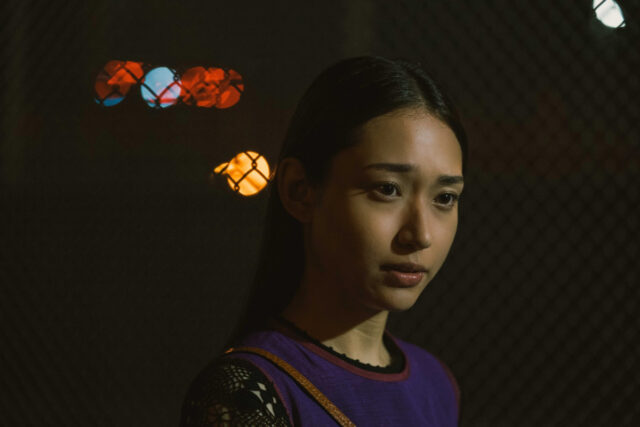
Everyone becomes obsessed with the title character in Gen Nagao’s strange and unusual The Box Man
JAPAN CUTS: FESTIVAL OF NEW JAPANESE FILM
Japan Society
333 East 47th St. at First Ave.
July 10-21, $10-$25
212-715-1258
www.japansociety.org
“I never would have expected to be praised for my tentative steps as an actor at Japan Cuts, a film festival in New York!” eighty-two-year-old Chinese-born Japanese actor Tatsuya Fuji said about winning the Lifetime Achievement Award at this year’s fest at Japan Society. “The last time I visited New York was nearly half a century ago. Back then, Nagisa Oshima’s film, In the Realm of the Senses, was invited to the New York Film Festival, but unfortunately, it couldn’t be screened due to censorship. And now, in 2024, the film I participated in, Great Absence, is being screened in New York, and they’ve even given me an award! I am overwhelmed with emotion!”
It would be a shame for movie lovers to be absent at the seventeenth annual festival, which runs July 10-21 and celebrates new Japanese film with more than thirty features, documentaries, animation, shorts, and a few classics. The opening-night selection is Masanori Tominaga’s Between the White Key and the Black Key, which takes place over the course of one night in the life of jazz pianist Hiroshi Minami. The centerpiece is Shadow of Fire, which concludes Shinya Tsukamoto’s war trilogy that began with Fires on the Plain and Killing and stars Cut Above honoree Mirai Moriyama. The festival comes to an end with the international premiere of Hideaki Anno and Shinji Higuchi’s Shin Godzilla: ORTHOchromatic, a revised version of the 2016 original.
In between there are family-friendly works, romance stories, manga-based cartoons, searches for the meaning of existence, and a samurai tale from Takeshi Kitano. As is my preference every July, I’ve checked out two of the most unorthodox films, a pair that are unexpectedly similar in their use of black-and-white, dialogue, sex, violence, music, small casts, and investigations of loneliness.

A man (Daiki Hiba) and woman (Misa Wada) fear danger ahead in Gen Nagao’s Motion Picture: Choke
MOTION PICTURE: CHOKE (『映画 (窒息)』/ EIGA CHISSOKU) (Gen Nagao, 2023)
Friday, July 12, 9:00
japansociety.org
Nary a word is spoken in Gen Nagao’s black-and-white Motion Picture: Choke, which is set in a dystopian past/future that is either pre- or postverbal as it explores the inflexibility of the human condition in an unidentifiable time or place. The film begins in total darkness with Kiyoyuki Yoshikawa’s pulsating score, evoking the music of Bernard Herrmann in Alfred Hitchcock thrillers, followed by a frightening figure in black crawling up a woman’s body. The terrified woman (Misa Wada) awakes from the dream, panting, but then goes about her daily chores. Dressed in ragged, primitive clothing reminiscent of what Raquel Welch wore in One Million Years B.C., she scavenges for food, washes herself in a stream, collects water, and weaves by candlelight.
Living in an abandoned three-level concrete building with no outside walls or doors, she seems to enjoy her life. Every so often, a sweet-natured elderly peddler (Minori Terada) stops by to barter by playing a game. Everything is pleasant until a white-robed man (Takashi Nishina) and his two underlings (Yuri Tajima and Hiroshi Niki) brutally attack the woman, leaving her devastated and angry. She constructs a trap for protection that captures a shirtless young man (Daiki Hiba), who she ties to a wall like Jesus on a cross. They ultimately start a charming partnership, learning together how to survive this empty world, but when the evil bandits return, male toxicity rises up as a battle for power ensues — with the woman determined to not play the victim again.
In only his second full-length film, following 2019’s Someday in Love, Nagao is in complete command as he explores multiple genres; perhaps Motion Picture is part of the title to remind the viewer that this is about the cinematic experience as much as it is a history of how women have been treated by men since the beginning of time. Wada (Cape’s Brothers and Sisters, Kiku to Guillotine) is captivating as the woman, who is not about to get taken advantage of twice. She has an understanding of life that the men will never have, especially when she seeks revenge.
The lack of dialogue is no mere gimmick; instead, it harkens to how humans communicate with one another in the most basic of ways in any era, without language, like animals. The film is gorgeously photographed by Sota Takahashi, with stark lighting by Kohei Kajimoto; Yoshikawa’s music shifts genres as well, from ominous and threatening to innocent and playful.
From its opening moments to its startling, accusatory finale, Choke is precisely the kind of film that makes Japan Cuts one of the best festivals of the year.

A nurse (Koichi Sato) contemplates her future in Gakuryu Ishii’s strange and unusual The Box Man
THE BOX MAN (『箱 男 / HAKO OTOKO) (Gakuryu Ishii, 2024)
Saturday, July 13, 5:30
japansociety.org
“Those who obsess over the box man become the box man,” a man in a shabby box whispers early in Gakuryu Ishii’s creepy, bizarre adaptation of Kōbō Abe 1973 novel, The Box Man.
I can now firmly declare that I am obsessed with the box man. But aren’t we all?
The film takes place just as the prosperity of Japan’s Shōwa period is ending in 1973. The first few minutes are in black-and-white, featuring Abe’s street photography, before we meet the box man, aka Myself (Masatoshi Nagase), who declares in voice-over:
“I see right through everything. A fabricated box you put your faith in. It is you people who live inside it. I have abandoned all that is fake, to obtain the real thing. What is more, I can see. You people as you truly are. The hidden shape of this world. Together with this box, the world shall be completely reborn. I am the box man. I gaze at you unilaterally.”
As it turns to color, he continues, “I become identifiable. You may see me, but you pay no attention. You feign ignorance. And yet, just as I once did, if you become overly aware of the box man . . .”
The box man lives in a cardboard box that reaches down to his knees; it is from the Argon company, makers of medical supplies. There’s a rectangular slit on one side so he can see in front of him; the horizontal space resembles a letterboxed film, except in this case it works both ways, from the inside and the outside. He watches us as we watch him.
He moves stealthily through the streets, avoiding unnecessary contact, until he’s being tracked by a photographer with a rifle and threatened by a slingshot-wielding ex-military madman. But soon he finds himself in a small, private hospital run by an older gentleman called the General (Ayana Shiramoto), his assistant, a doctor (Tadanobu Asano), and their nurse (Koichi Sato), where an odd power dynamic unfolds involving self-identity, sex, control over one’s body and mind, who gets to tell their story, and reality itself.
Ishii’s film has been thirty years in the making, when he received Abe’s blessing to go forward with it. The book has previously been adapted into two short films, but this is the first full-length version, with screenwriters Kiyotaka Inagaki and Ishii (Crazy Thunder Road, Punksamurai Slash Down) making significant changes while staying true to Abe’s original vision.
Hideho Urata’s photography gives the film an immersive quality, as if we are all in our own box, which is sort of true whether we’re experiencing it at home on a TV or streaming device or in a theater. When the doctor is questioned by a detective (Yûko Nakamura) in a police interview room, another cop peers through a long slit in a wall, making him another kind of box man. Michiaki Katsumoto’s wide-ranging score guides us through 1940s detective noir, 1960s jangly pop, 1970s thriller, and a hilarious psychedelic scene with an enema.
The Box Man doesn’t always make sense; some plot twists are hard to decipher, and it is too long at two hours, but you won’t be able to look away for even a second. You’ll also wonder what life inside a box could be like, if you’re not already in one, psychologically or physically.
Like Motion Picture: Choke, The Box Man deals with loneliness, sex, violence, love, faith, misogyny, homelessness, and a dark future in which humanity builds cages for themselves and others, as well as how we tell stories — and who gets to tell them. At one point, the box man sees words appear on a wall, expressing, “Within this labyrinth, I shall seek an exit.” But getting out is not going to be easy, for any of us.
The Box Man is screening July 13 at 5:30 at Japan Society, with Ishii on hand for a Q&A. He will also participate in a Q&A following the July 14 showing of his 1995 rite-of-passage drama, August in the Water.
[Mark Rifkin is a Brooklyn-born, Manhattan-based writer and editor; you can follow him on Substack here.]